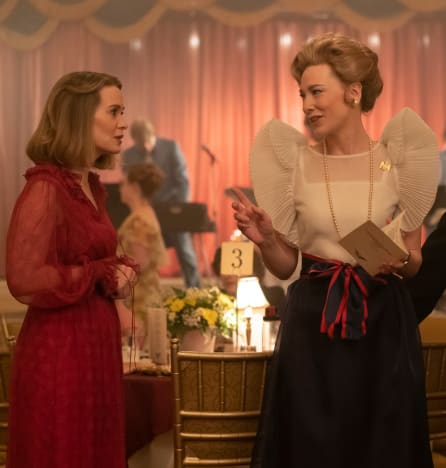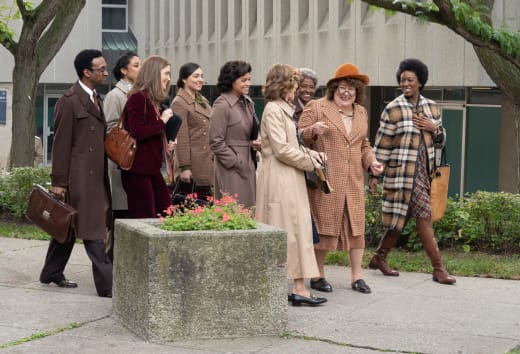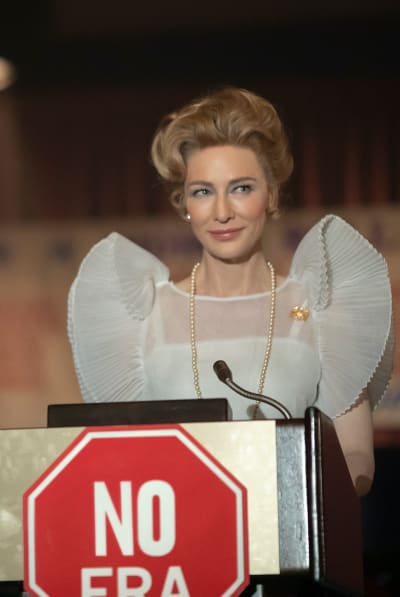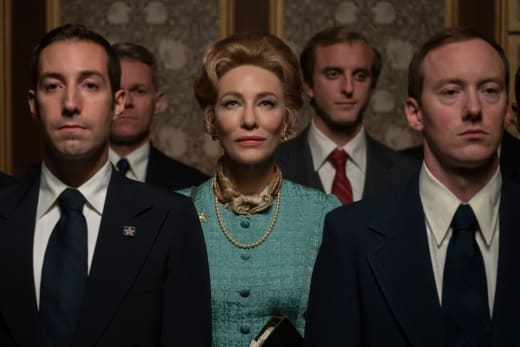Everything came to a hilt on Mrs. America Season 1 Episode 9.
While the episode was not as epic as a finale usually is, “Reagan,” was still satisfying, and gave us some closure.
Particularly with Alice’s arc, although there were a few storylines that left us with unanswered questions.
Alice’s character revolutionized when she finally stood up to Phyllis. She was the most developed character throughout the series.
It was evident when she drove away from Phyllis’s home, presumably, for the last time.
Although Alice was still far from being a feminist, she realized that she did not have to adhere to every move Phyllis made. Their friendship did more harm than good.
Alice: I like not having to ask him for PIN money. It’s empowering.
Phyllis: You used to feel empowered by me.
Alice: I used to feel scared.
Phyllis’s version of empowerment was never about empowering those around her, but about controlling them. Although Alice brought the ERA to Phyllis’s attention, Phyllis decided to include racism and homophobia in her message. She used the ERA to her advantage, not caring about her friends’ concerns.
Alice never felt suffocated by her husband or her life as a homemaker. However, she did feel suffocated by Phyllis, who used her as a means to an end.
When Alice drove away from Phyllis’s home, she finally gained her freedom. We can only hope that she did not leave Pamela in the dust since her fate remains unknown, but that was a strategic decision Mrs. America made.
Pamela was one of the few characters not based on a real person, but that did not mean her circumstances were fake. Pamela’s character represented a grim reality for many middle-class women at the time: struggling in an abusive marriage.
If this were real life, Pamela probably would not have left her husband. She joined Stop ERA as a way to escape her situation, but Phyllis manipulated her into thinking that Kevin’s abuse was her fault.
Many women never had a chance to leave their abusers. Not disclosing Pamela’s fate was a cruel but necessary reminder of the real women who suffered through decades of spousal abuse.
But Pamela was not the only character who got a vague ending.
Bella and Gloria had a little more closure, but their respective storylines were open-ended enough to pose some questions.
When Bella got fired from her position as head of the Women’s Commission, she was heartbroken, but she trudged on. It was not until Reagan got elected president in 1980 when she truly felt lost.
Not only did she lose her job, but Reagan’s presidency meant she was not going to find a new job anytime soon. So, Bella did not know what she was going to do next.
She discussed options with her husband, but one thing was clear — it was time to take a step back from politics, even if Bella did not want to, and even if her break was temporary.
Bella had a whole set of choices ahead of her, but she knew no matter what she chose, it would not have to do with politics. Her decision was not a sign of defeat, but rather, a sign to take time to reflect before moving forward.
As for Gloria, she sold Ms. after nearly a decade of running the magazine. She organized the full resignation of the Women’s Commission after what happened to Bella. Otherwise, her future was also up in the air.
We are the ones that are going to have a press conference. We are going to tell the American people how disappointed we are with the President’s stand on women’s issues. He is going to have to do something for us to get us to vote for him. We’re no longer a captive audience.
Gloria
Gloria did not have the same options Bella did, so, things seemed more uncertain. But she knew she had to keep fighting for women and minorities everywhere, regardless of who held office.
It was ironic because unlike Gloria, Betty had solid plans — she was organizing events to draw attention to the Equal Rights Amendment. Meanwhile, Gloria seemed unenthused about the road ahead.
But Betty was more discouraged about the election results that Gloria was. They just had to bounce back and fight harder than they did before.
Gloria may have been the one walking into a hazy unknown, but she could not give up. She was in this fight, for better, or for worse, until misogyny, racism, and other bigotry got eradicated, for good.
Betty: The tide is turning against us in Washington.
Gloria: Our movement didn’t start in Washington; it’s not going to be stopped by it.
“Reagan” may not have been a wild finale, but it certainly provided a valuable lesson, especially considering our current climate.
Thanks, Mrs. America.
As for Phyllis, she ended in the complete opposite place she started in.
On Mrs. America Season 1 Episode 1, Phyllis was a guest on Phil Crane’s talk show. She was actively involved with politics, specializing in national defense.
But “Reagan” concluded with Phyllis baking an apple pie, bringing the show full circle.
Before this episode, Phyllis never truly practiced what she preached. She consistently praised homemakers but was rarely home herself. She even tried to pass off as one when she took full credit for raising her six children.
But Phyllis would have never been able to get involved with politics had it not been for her sister-in-law, Eleanor. Eleanor sacrificed her life to help raise Phyllis and Fred’s children.
Phyllis did not know what it was honestly like to be a homemaker until the President-Elect called to say she did not receive a cabinet position.
The news devastated Phyllis. Everything she worked for over the last decade was just not to achieve her dream job. The phone call made Phyllis realize she would stay home and resume fulltime duties as a homemaker.
The only way Phyllis could move on was to believe that this was the way things should be. Despite everything she worked for, and despite being promised a cabinet position, she told herself that she had to stay home to take care of her family.
Phyllis did not embody a homemaker until the last few moments of the episode. Before then, she took credit not only from Eleanor but from her housekeeper.
On Mrs. America Season 1 Episode 2, Phyllis and her women traveled to Illinois’s Capitol Building to hand out bread and pies. While some of the women baked their own, Phyllis’s housekeeper baked the pies Phyllis brought, even though she took credit for it.
Now, Phyllis understands the role of a homemaker. She knew how to bake before, but she only put her knowledge into practice at the very end. She has become one of them.
This last scene was a fitting ending for an even more fitting television show to watch during this political climate.
I have stood alongside the greatest women of our generation. Still, today, we select our leaders first by eliminating women and minorities and those with too little education. Changing this will take a very long time. After all, we are dealing with ten thousand years of patriarchy and racism. But we must continue to move forward in waves. What will keep us going is the revelation of what we can be. What the people around us can be, without the crippling walls and prisons into which we have been forced. We are just beginning to discover each of us, who we can be. And no matter how long this revolution may take, there can be no turning back.
Gloria
Over to you, Fanatics!
What did you think of the mini-series finale, Mrs. America Season 1 Episode 9? Did it exceed your expectations, or were you disappointed? How do you feel about where the characters ended up? Phyllis? Alice? Bella? Gloria? Or, what about the characters that were left hanging, like Pamela?
Drop your thoughts in the comments below!
If you need to catch up, watch Mrs. America online right here, at TV Fanatic!
Sarah Novack is a staff writer for TV Fanatic. Follow her on Twitter.








